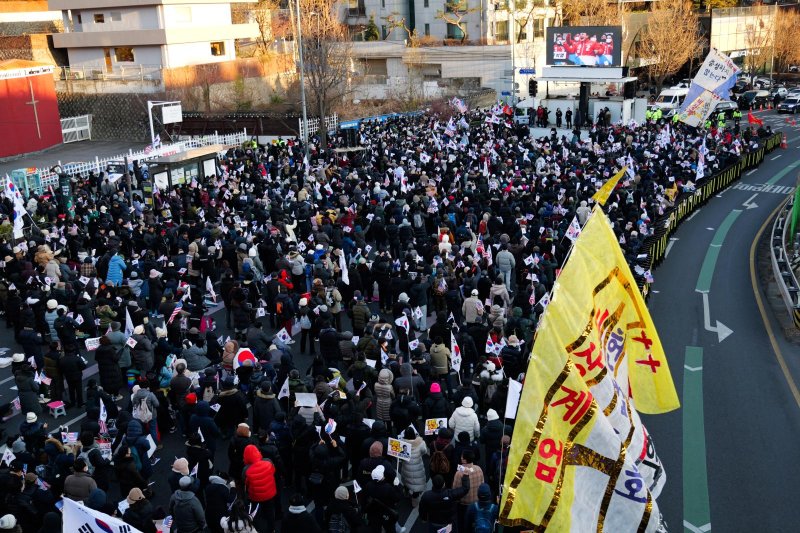1 of 2 | Large crowds of supporters have gathered outside of impeached South Korean President Yoon Suk Yeol’s residence this week as he faces an arrest warrant for his martial law declaration last month. On Friday, investigators called off an attempt to execute the warrant after facing resistance from the presidential security detail. Photo by Thomas Maresca/UPI
SEOUL, Jan. 3 (UPI) — South Korean anti-corruption officials and police withdrew from an attempt to arrest impeached President Yoon Suk Yeol at his residence Friday after an hours-long standoff with the presidential security detail.
The Corruption Investigation Office for High-ranking Officials arrived early Friday morning to execute an arrest warrant for insurrection and abuse of power allegations following Yoon’s short-lived declaration of martial law on Dec. 3.
However, the CIO said that it suspended efforts at roughly 1:30 p.m. after failing to gain access to the residence.
“We judged that it was virtually impossible to execute the arrest warrant, and we stopped the execution due to concerns about the safety of on-site personnel,” the CIO said in a message to reporters. “We will decide on future measures after review.”
“We deeply regret the attitude of the suspect who did not comply with the procedures in accordance with the law,” the statement added.
A CIO official later told reporters that a team of 20 CIO personnel and 80 police officers were unable to pass a blockade of vehicles and roughly 200 members of the Presidential Security Service.
“I understand there were scuffles big and small at each stage,” the official said, according to news agency Yonhap.
The opposition Democratic Party, which led the successful impeachment motion against Yoon on Dec. 14, called suspending the execution of the arrest warrant “very regrettable.”
“[Yoon’s] statement that he would fulfill his legal and political responsibilities was a blatant lie,” floor leader Park Chan-dae said in a statement. “The most urgent task for overcoming the crisis facing our country is to quickly arrest the leader of the rebellion. The longer we delay, the more the damage will snowball.”
A South Korean court authorized a warrant Tuesday for Yoon’s arrest, and officials said they planned to take him to the CIO’s headquarters in Gwacheon for questioning before detaining him at the Seoul Detention Center.
The CIO has until Monday to execute the warrant before it expires. If the deadline passes, they can apply for a new warrant.
Large crowds of conservative supporters have gathered near Yoon’s residence in Seoul’s Hannam-dong neighborhood since the warrant was issued. Late Wednesday night, Yoon sent a defiant message to the crowd, vowing to “fight to the end to protect this country.”
“The Republic of Korea is now in danger due to the forces of encroachment on sovereignty and anti-state forces both inside and outside the country,” Yoon wrote in a letter. “I will fight to the end to protect this country with you.”
Yoon claimed that he declared martial law to protect the public from the “pro-North Korea anti-state forces” in the Democratic Party that have obstructed his agenda and paralyzed the government. He has also frequently repeated unsubstantiated election fraud claims and recently said that there was evidence of a North Korean hacking attack on the National Election Commission.
Supporters have echoed Yoon’s claims, with many carrying “Stop the Steal” signs alongside South Korean and American flags. Protesters, whose numbers swelled Friday afternoon into the thousands, cheered after news of the CIO’s withdrawal broke.
Anti-Yoon counter-protesters, led by the Korean Confederation of Trade Unions, announced an overnight vigil Friday calling for the impeached president’s arrest.
